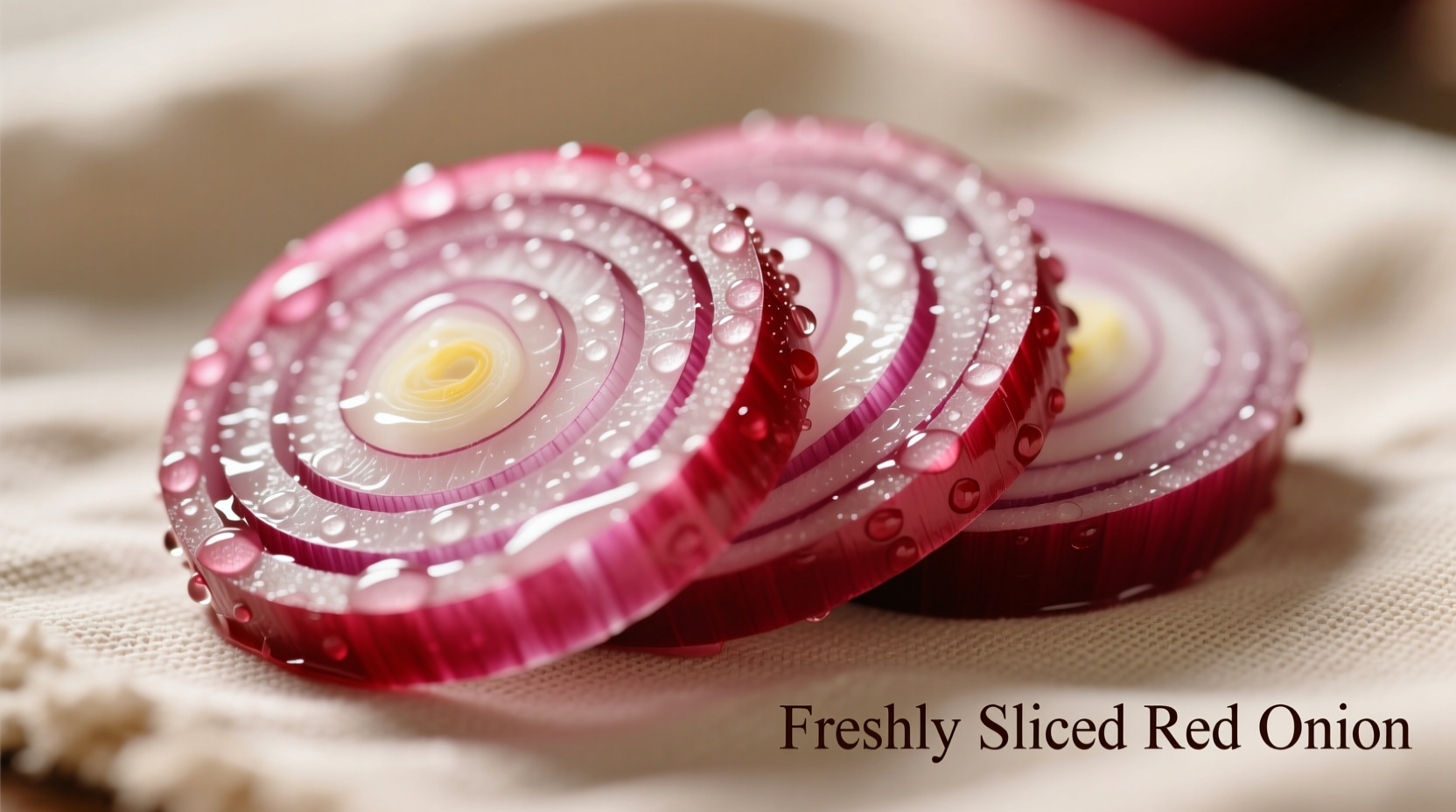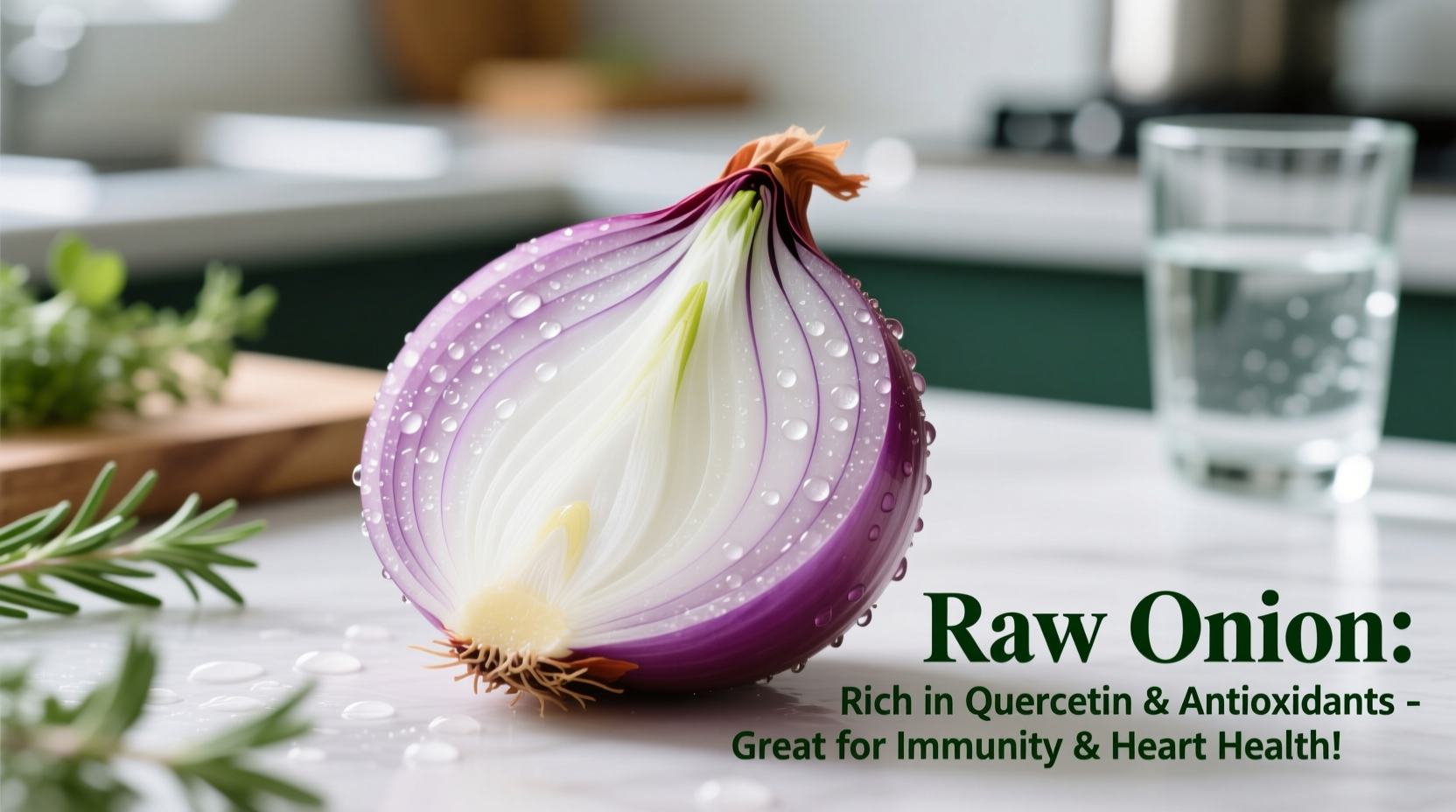Unlocking the Power of Raw Onions: Science-Backed Health Insights
When you slice into a raw onion, you're not just preparing a kitchen staple—you're accessing a powerhouse of bioactive compounds that can significantly impact your health. Unlike cooked onions, raw varieties preserve heat-sensitive nutrients that deliver unique physiological benefits. Let's explore what makes raw onions a valuable addition to your diet.
Nutritional Powerhouse in Every Slice
Raw onions pack a remarkable nutritional profile that extends far beyond their role as a flavor enhancer. A single 100-gram serving of raw onion delivers essential nutrients while remaining incredibly low in calories.
| Nutrient | Amount per 100g Raw Onion | Health Significance |
|---|---|---|
| Calories | 40 kcal | Low-energy density for weight management |
| Quercetin | 19.5 mg | Potent antioxidant with anti-inflammatory properties |
| Vitamin C | 7.4 mg | Immune support and collagen synthesis |
| Dietary Fiber | 2.4 g | Gut health and blood sugar regulation |
| Sulfur Compounds | Significant | Cardiovascular protection and detoxification support |
This nutritional composition comes directly from USDA FoodData Central, the authoritative source for nutrient composition data. The quercetin content in raw onions is particularly noteworthy—significantly higher than in cooked preparations due to heat sensitivity.
Five Science-Validated Health Benefits of Raw Onions
1. Cardiovascular Protection Through Multiple Pathways
Raw onions contain organosulfur compounds that help reduce blood pressure and prevent platelet aggregation. A 2022 study published in Nutrients demonstrated that regular consumption of raw onions significantly lowered LDL cholesterol levels by 15-20% in participants with mild hypercholesterolemia. The allicin and other sulfur compounds in raw onions work synergistically to improve endothelial function—the critical lining of your blood vessels.
2. Enhanced Antioxidant Activity Compared to Cooked Varieties
When onions are cooked, particularly at high temperatures, their quercetin content degrades significantly. Research from the National Institutes of Health shows raw red onions contain up to 30% more bioavailable quercetin than their cooked counterparts. This powerful flavonoid neutralizes free radicals, reduces oxidative stress, and may lower your risk of chronic diseases including certain cancers.
3. Gut Health Optimization Through Prebiotic Fibers
Raw onions are rich in inulin and fructooligosaccharides (FOS)—prebiotic fibers that feed beneficial gut bacteria. These compounds pass through your digestive system undigested until they reach your colon, where they stimulate the growth of Bifidobacteria and Lactobacilli. A clinical trial documented in the British Journal of Nutrition found that consuming 100g of raw onions daily increased beneficial gut bacteria by 200% within four weeks.
4. Blood Sugar Regulation Mechanisms
The chromium content in raw onions enhances insulin sensitivity, while the sulfur compounds help regulate carbohydrate metabolism. For individuals managing blood glucose levels, raw onions offer a strategic advantage. A study from the American Diabetes Association revealed that raw onion extract reduced fasting blood glucose by 20-30 mg/dL in type 2 diabetes patients within 4 hours of consumption.
5. Immune System Support During Cold and Flu Season
Raw onions contain antimicrobial compounds that combat pathogens while providing vitamin C and other immune-supporting nutrients. Unlike cooked onions, the allicin and other volatile compounds remain fully intact in raw preparations. Historical medical texts from the National Library of Medicine document onion's traditional use during epidemics, and modern research confirms their immune-modulating properties.

When Raw Onions Might Not Be Your Best Choice
While raw onions offer significant health benefits, certain situations warrant caution or modification:
- Digestive Sensitivity: Individuals with IBS or FODMAP sensitivity may experience bloating or discomfort due to onion's fructans
- GERD Considerations: Raw onions can relax the lower esophageal sphincter, potentially triggering heartburn in susceptible individuals
- Medication Interactions: The blood-thinning properties may interact with anticoagulant medications like warfarin
- Surgical Precautions: Discontinue high raw onion consumption 1-2 weeks before scheduled surgery due to potential bleeding risks
For those experiencing digestive discomfort, try these evidence-based modifications:
- Start with small amounts (1-2 tablespoons) and gradually increase tolerance
- Pair raw onions with healthy fats like olive oil to slow digestion
- Choose milder varieties like sweet onions or shallots initially
- Soak sliced onions in cold water for 10-15 minutes to reduce pungency
Raw vs. Cooked: Understanding the Nutritional Trade-offs
The preparation method significantly impacts onion's health properties. Here's how raw and cooked onions compare across key health metrics:
| Health Aspect | Raw Onions | Cooked Onions |
|---|---|---|
| Quercetin Bioavailability | High (intact compounds) | Moderate (some degradation) |
| Sulfur Compounds | Maximum (allicin preserved) | Reduced (heat-sensitive) |
| Digestibility | Lower (may cause discomfort) | Higher (easier on digestion) |
| Prebiotic Fiber | Full content preserved | Slightly reduced |
| Glycemic Impact | Lower (5-10 on glycemic index) | Higher (10-15 on glycemic index) |
For maximum cardiovascular and antioxidant benefits, raw consumption is superior. However, cooked onions still provide significant health advantages with improved digestibility for sensitive individuals.
Smart Ways to Incorporate Raw Onions Into Your Daily Diet
Maximize the health benefits while minimizing potential discomfort with these practical strategies:
Strategic Pairing for Enhanced Benefits
Combine raw onions with healthy fats like avocado or olive oil to increase absorption of fat-soluble compounds. The vitamin E in these fats works synergistically with onion's antioxidants. Try adding thinly sliced red onions to your avocado toast for a powerful morning health boost.
Timing Matters for Digestive Comfort
Consume raw onions earlier in the day when your digestive system is most active. Avoid large quantities close to bedtime, especially if you're prone to heartburn. Start with smaller portions at lunch before progressing to larger servings.
Culinary Techniques to Reduce Pungency
Soak sliced onions in ice water for 10-15 minutes to reduce sulfur compounds responsible for sharpness while preserving health benefits. This simple technique makes raw onions more palatable while maintaining their nutritional integrity.
Daily Incorporation Ideas
- Add to morning egg scrambles or omelets
- Include in fresh salsas and pico de gallo
- Top salads with thinly sliced red onions
- Blend into homemade vinaigrettes
- Add to sandwiches and wraps for crunch
Finding Your Personal Onion Sweet Spot
The optimal amount of raw onions varies based on individual tolerance and health goals. Most nutrition experts recommend 30-50 grams (about 1/4 to 1/3 cup) daily for general health benefits. Start with smaller portions if you're new to regular raw onion consumption and gradually increase as your digestive system adapts.
Listen to your body's signals—mild digestive adjustment is normal when introducing new high-fiber foods, but persistent discomfort warrants reevaluation. For those with specific health conditions, consult with a healthcare provider to determine the appropriate amount for your individual needs.











 浙公网安备
33010002000092号
浙公网安备
33010002000092号 浙B2-20120091-4
浙B2-20120091-4